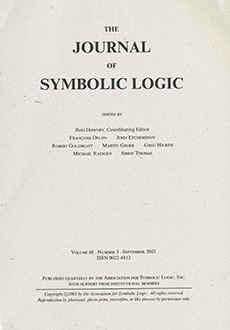Abstract
We examine a definition of the mutual information of two reals proposed by Levin in [5]. The mutual information is $$I(A:B)=\log\sum\limits_{\sigma,\tau\in 2^{<\omega}} 2^{K(\sigma)-K^A(\sigma)+K(\tau)-K^B(\tau)-K(\sigma,\tau)},$$ where $K(\cdot)$ is the prefix-free Kolmogorov complexity. A real $A$ is said to have finite self-information if $I(A:A)$ is finite. We give a construction for a perfect $\Pi^0_1$ class of reals with this property, which settles some open questions posed by Hirschfeldt and Weber. The construction produces a perfect set of reals with $K(\sigma)\leq^+ K^{A}(\sigma)+f(\sigma)$ for any given $\Delta^0_2$ $f$ with a particularly nice approximation and for a specific choice of $f$ it can also be used to produce a perfect $\Pi^0_1$ set of reals that are low for effective Hausdorff dimension and effective packing dimension. The construction can be further adapted to produce a single perfect set of reals that satisfy $K(\sigma) \leq^+ K^A(\sigma)+f(\sigma)$ for all $f$ in a ‘nice' class of $\Delta^0_2$ functions which includes all $\Delta^0_2$ orders.
Citation
Ian Herbert. "A perfect set of reals with finite self-information." J. Symbolic Logic 78 (4) 1229 - 1246, December 2013. https://doi.org/10.2178/jsl.7804130
Information





